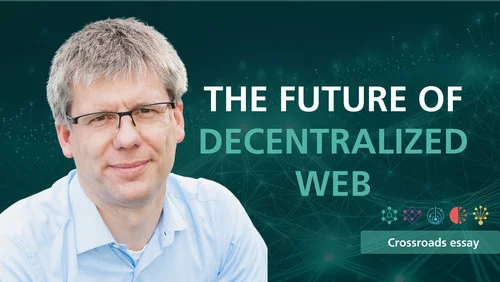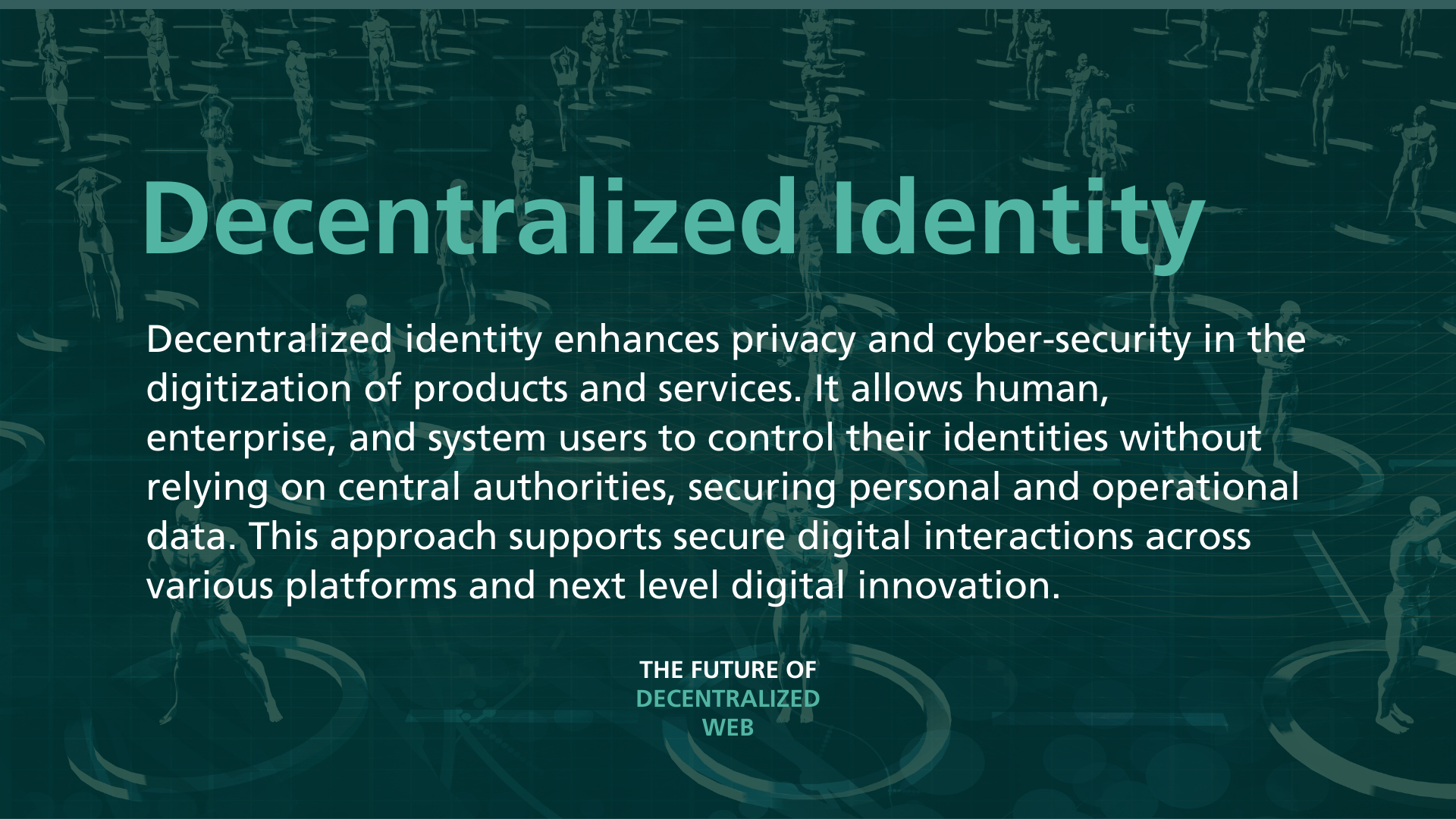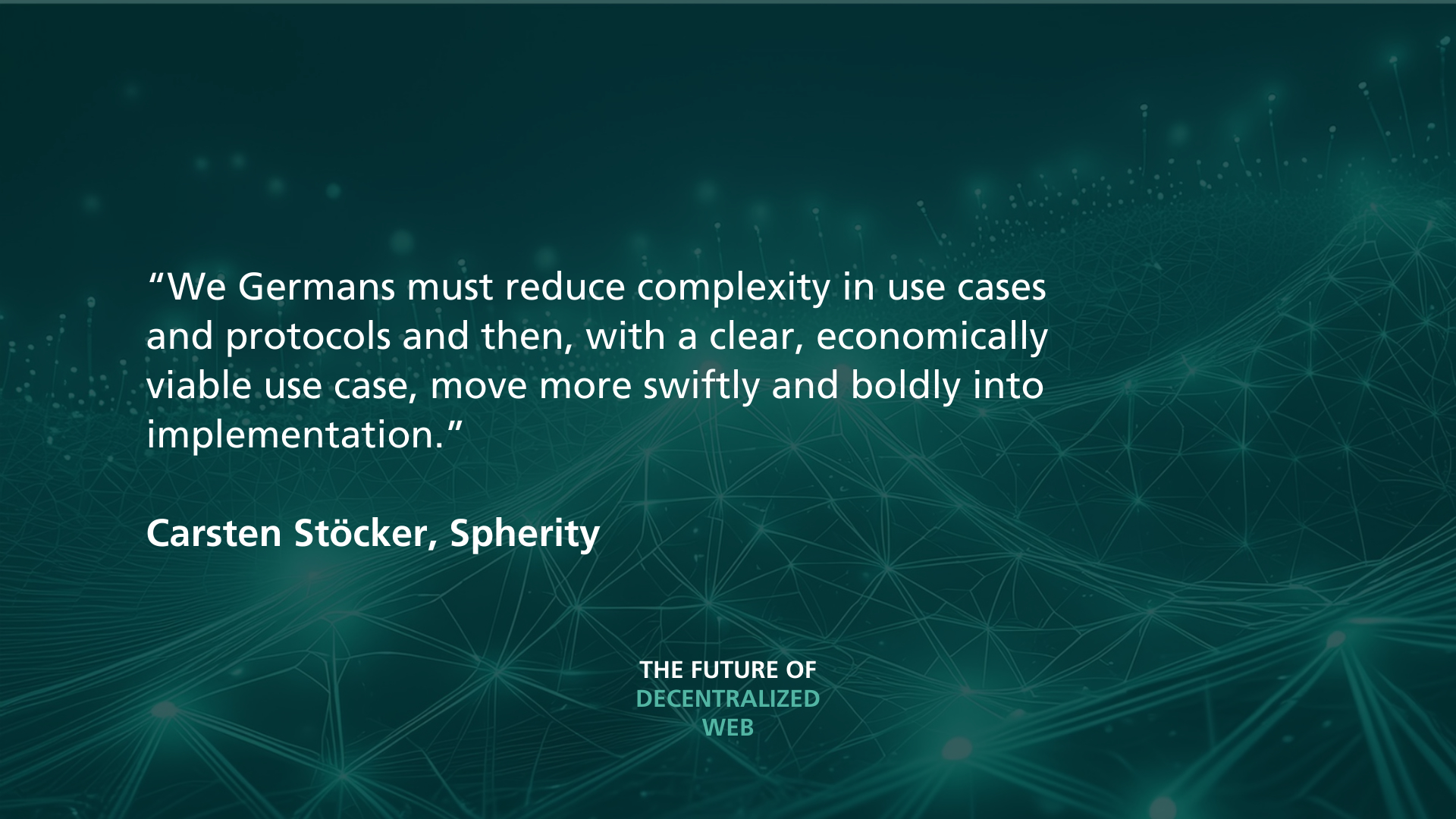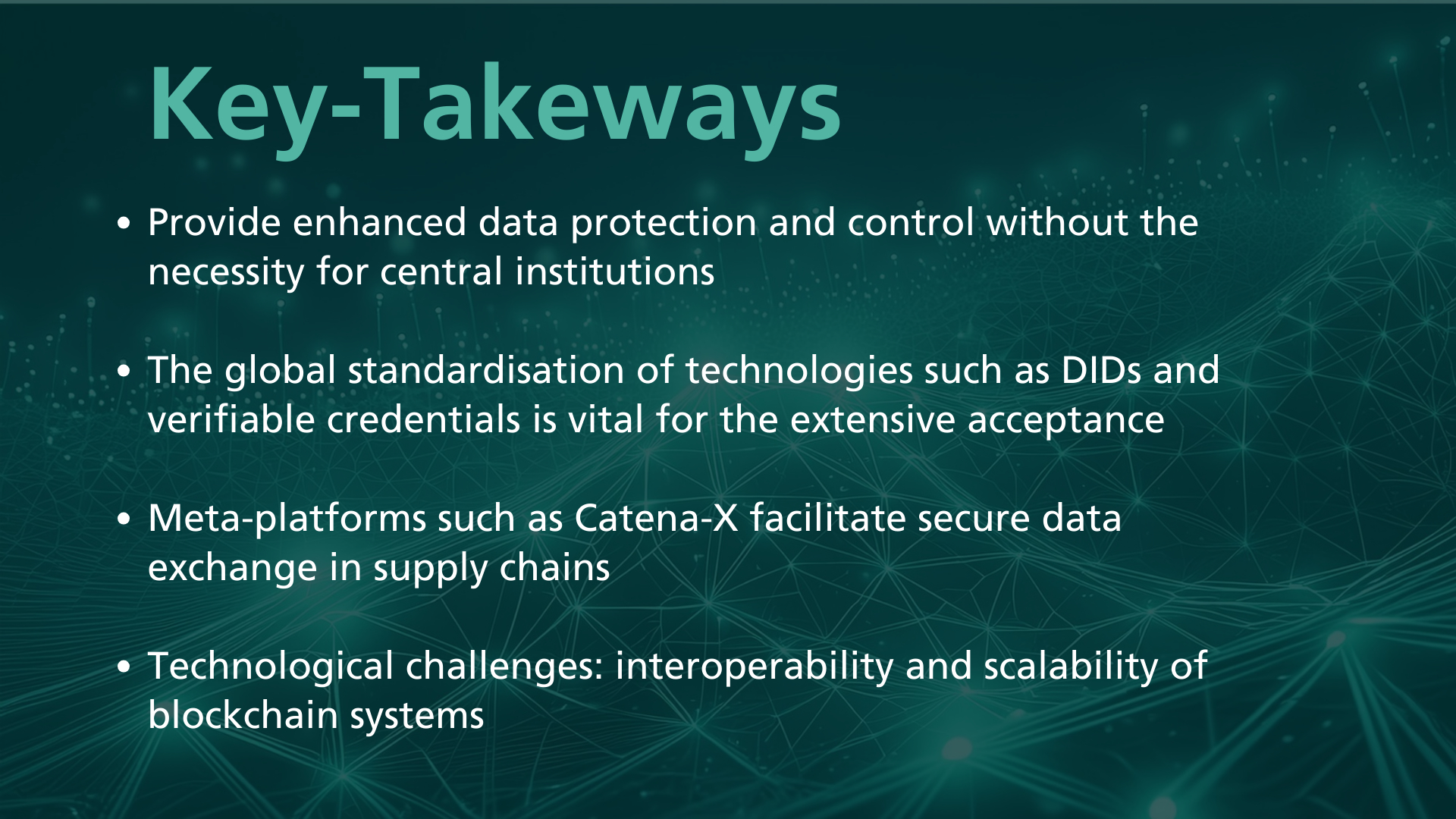
07. October 2024
Web3 - outlook for the next 10 years with Dr. Carsten Stöcker, CEO of Spherity GmbH
We recently published our Crossroads essay “The Future of Decentralized Web”. What we know about the decentralized web and what impact it will have on the German media and communications market in the next 10 years. With our interview series we would like to give you exciting insights from our expert interviews and start the series with Dr. Carsten Stöcker, CEO of Spherity GmbH.
He is the founder of Spherity GmbH. Spherity is a scalable decentralized identity cloud platform for the fourth industrial revolution that connects the physical, biological and digital spheres. Dr. Carsten Stöcker is a trained physicist and holds a doctorate from the University of Aachen. He was also a council member of the Global Future Network of the World Economic Forum. He is passionate about translating identity and trust technologies into productive solutions for secure supply chains, the circular economy and the fourth industrial revolution.
Introduction: The new age of digital identities
In a world that is increasingly dependent on digital identities, concepts such as decentralised data management and decentralised identity are becoming increasingly important.
Decentralised identities - also known as Self-Sovereign Identity (SSI) - allow individuals and companies to manage their own data without having to rely on a central institution such as Google, Facebook, Bosch or Siemens. These identities are based on open standards and robust security mechanisms and offer greater privacy and control over personal or corporate data.
The dynamic expansion of this market, fuelled by the need for more secure and user-friendly identity management solutions, promises an annual growth rate of over 90% until 2030, according to Grand View Research and Gartner (https://www.grandviewresearch.com/industry-analysis/decentralized-identity-market-report, https://www.gartner.com/en/documents/5560195). These solutions are fundamental to digital innovation and improving data protection and compliance in various industries.
Citizen identity in the EU
With the EUDI Wallet, the European Union is laying the foundations for a comprehensive citizen identity. This digital wallet enables citizens to identify themselves with digital versions of ID cards, driving licences or membership cards. In future, EU citizens will not only be able to use it to travel, but also to make secure and simple purchases. This development promises to make people's everyday lives much easier and promote digital integration within the EU.
Industry 4.0 and the decentralised web
The development of Industry 4.0 is based on the comprehensive networking and automation of production processes. Decentralised identities play a decisive role here, as they not only increase the security of these networked systems, but also place control over data directly in the hands of the users. In this context, the use of decentralised systems offers a clear advantage over centralised approaches. While centralised systems collect and manage data in one place, which can lead to security risks and dependencies, decentralised systems distribute the data across different nodes. This not only creates more security and control, but also enables a scalable infrastructure.
A concrete example of this is the use of IoT devices in Industry 4.0. These devices constantly generate data and communicate with each other. By using decentralised identities, these IoT devices can be uniquely identified and authenticated, ensuring that only authorised devices and users can access sensitive production data. This protects the systems from tampering and cyberattacks and creates the basis for a secure and robust industrial revolution.
Centralised vs. decentralised systems
Decentralised systems minimise risk and put data control in the hands of users, as opposed to centralised systems that store and manage data on the servers of large technology companies. This is particularly relevant in a hyper-connected world where previously unknown users are constantly interacting with each other and trust must be established through secure digital identities.
EU Data Strategy
With its data strategy, the EU is pursuing the goal of creating a digital infrastructure that is based on data sovereignty and operates independently of large tech platforms. The focus is on Europe's ability to control, protect and efficiently utilise its own data. This requires not only stronger regulation, but also the political will to decentralise the internet and reduce dependence on monopolistic players. The EU's data spaces, which are emerging in various sectors such as health, mobility and industry, are part of this strategy and should enable the free, secure and transparent exchange of data between European players.
Decentralised identities are key to this strategy as they give citizens and businesses full control over their data, as opposed to centralised systems where large tech platforms manage the data. This technology supports the creation of a more sustainable digital economy that is based on data security, fair competition and independence. The EU sees this as a key way to ensure data protection while strengthening Europe's competitiveness in the digital economy.
Metaplatforms and network effects
Metaplatforms offer companies the opportunity to work together across different digital ecosystems without having to rely on a central controlling authority. An excellent example of this is Catena-X in the automotive industry. This platform enables various players within a supply chain - from suppliers to manufacturers - to exchange data securely and efficiently. Decentralised identities play a central role in ensuring that all companies and systems involved are uniquely authenticated and that only authorised access takes place.
The advantage of such meta platforms is that the companies involved can control their own data while operating in a networked system. This makes data exchange in the supply chain more secure and transparent and increases trust between the partners without the need for a centralised platform that could harbour risks of data misuse or dependencies.
Such platforms not only create network effects by encouraging more participants to join - the more companies that participate, the more valuable the platform becomes - but they also promote interoperability and seamless data exchange between different systems and industries.
The need for a modernised Internet
Although the Internet was originally designed to be decentralised, centralised platforms have since become the measure of all things. The adoption of a secure trust infrastructure based on decentralised identities is therefore still pending. Technology now allows us to address this issue and create an ‘Internet Next Level’, which is crucial for our modern world - characterised by disinformation, cyber warfare and advancing digitalisation - so that we can move safely in the digital world and our future smart cities at the same time. This blog post highlights the important role that decentralised identities will play in the future of the internet and the global economy by creating a more secure and collaborative digital environment.

Current state of the technology: standardisation and adoption
The success of decentralised identity technologies depends heavily on standardisation and adoption. Standards such as Decentralised Identifiers (DIDs) and Verifiable Credentials (VCs), which were developed by the World Wide Web Consortium (W3C), form the basis for interoperability. This interoperability is crucial in order to be able to use identity data securely and across platforms. Initiatives such as the Decentralised Identity Foundation (DIF) and the European Digital Identity Wallet (EUDI Wallet) as well as the Architecture Reference Framework (ARF) continue to drive the spread.
Spherity is actively involved in standardisation by supporting the W3C, DIF and the EU Digital Identity Wallet. Our work promotes the dissemination and acceptance of the technology in Germany. Among other things, we are currently working on implementing the technology to automate corporate KYC processes in the banking sector.
The EUDI Wallet (European Digital Identity Wallet) is a digital tool developed by the European Union to enable citizens and businesses to participate in the digital economy in a secure and trustworthy way. With the EUDI Wallet, people can store and use digital versions of their identity documents, such as ID cards or driving licences, as well as other proofs, such as membership cards or qualification certificates.
The wallet makes it possible to identify oneself digitally without always having to disclose all personal information. For example, a citizen can prove that they are of legal age without revealing their exact date of birth. This significantly increases data protection.
The EUDI Wallet also offers advantages for companies. It enables simplified identity verification and can be used, for example, in e-commerce or when dealing with the authorities digitally. The use of the EUDI Wallet strengthens interoperability within the EU so that citizens and companies can seamlessly utilise digital services in all member states.
In the near future - around 2-3 years - it will be possible for every EU citizen and every company to have such a wallet and thus participate securely in the digital economy. The introduction of the EUDI wallet is an important step towards a comprehensive digital transformation in Europe.
The technology is also being used internationally. In New Zealand, for example, digital vaccination cards were introduced during the COVID-19 crisis. In the automotive industry, the technology supports global value chains through projects such as Catena-X, which ensures the authenticity and origin of car parts. In the US, Spherity is improving the security of the pharmaceutical supply chain through the use of decentralised identities, which significantly strengthens the security of data exchange between authorised supply chain actors.
Future developments and innovations
Over the next ten years, decentralised identity technologies will grow exponentially and open up numerous new fields of application that will fundamentally change both everyday life and various industries. Based on eleven megatrends (https://medium.com/spherity/decentralized-identity-how-10-mega-trends-are-driving-adoption-and-shaping-the-future-c8144a51de1b), it is already clear that these technologies will play a key role in the digital economy and in building global trust. These trends include the increasing importance of data sovereignty, the shift towards Web3 and the integration of self-sovereign identity (SSI) into various digital ecosystems.
Technological advances
The advances in Industry 4.0 and the Internet of Things (IoT) are particularly visible. Projects such as Catena-X in the automotive industry are already using decentralised identities to ensure transparency and traceability in global supply chains. With the wider implementation of these technologies, it will be possible for product information to be tracked across the entire life cycle or for cross-company production processes to be optimised. This not only offers efficiency benefits, but also ensures greater security in supply chains, as the authenticity of components or products can be clearly verified.
In the financial sector, the use of SSI and decentralised financial systems (DeFi) will increase. These technologies enable people and companies to securely control their identities and data without having to rely on centralised entities such as banks. This will increase trust in digital transactions, especially in areas such as cross-border payments and digital asset management.
New fields of application
In the coming years, decentralised identities will become increasingly important in new areas such as cyber-physical systems (CPS), healthcare and sustainability. In the healthcare sector, technologies such as digital health cards, which are decentralised and interoperable, will become the standard solution for managing sensitive data securely and transparently. Patients can control their health data directly and share it with medical institutions in a targeted manner, which simultaneously protects their privacy and facilitates access to healthcare services.
In the area of sustainability, decentralised identities play a key role in the traceability of ESG data (environmental, social and governance data). The Digital Product Passport (DPP), which will soon be mandatory in the EU, will enable products to be transparently tracked and verified throughout their life cycle. This reduces the risk of greenwashing and ensures that companies fulfil their sustainability promises.
Potential impact on everyday life and industry
The introduction of decentralised identities will have a far-reaching impact not only on industry, but also on everyday life. The EUDI Wallet, which enables citizens to use digital identity documents, will make it easier and more secure to participate in the digital economy. This applies in particular to e-commerce, access to government services and travelling. Citizens will be able to use their digital identities across borders, making borderless trade and mobility within the EU much easier.
Decentralised identities will thus radically change the everyday lives of citizens as well as the operations of industries by promoting transparency, security and efficiency while strengthening control over personal and business data.
Challenges and limitations
The introduction of decentralised identities opens up numerous opportunities, but is also associated with considerable hurdles. These challenges can be divided into three main categories: technical, legal and social.
Technical challenges
One of the biggest technical challenges with decentralised identities is interoperability between the various platforms and ecosystems. In order to achieve broad acceptance, standards such as Decentralised Identifiers (DIDs) and Verifiable Credentials (VCs) must be adopted worldwide. However, the development of such global standards is complex, as it requires close cooperation between international bodies, governments and companies.
In addition, the scalability of blockchain-based systems represents a technical hurdle. Blockchains offer a high level of security, but can lead to bottlenecks when implemented globally, which can affect processing speed and costs. The management of keys in decentralised identity systems is also a technical problem, as users need to store their cryptographic keys securely, which is a challenge for many.
Legal challenges
Another significant obstacle to the introduction of decentralised identities is the legal framework. In Europe, the General Data Protection Regulation (GDPR) governs the handling of personal data. Decentralised identities must be GDPR-compliant, which means that users retain control over their data at all times. While this strengthens the protection of privacy, it also places new demands on the design of such systems.
In addition, there are very different data protection laws around the world. The EU's eIDAS 2.0 regulation aims to standardise the legal framework for identification and authentication in the digital space. However, harmonising such laws on a global level is a major challenge. The different regulations on identity verification, data protection and data processing make it difficult to develop universally applicable solutions.
Social challenges
On a social level, trust in this new technology is a major hurdle. Decentralised identities offer users the opportunity to manage their own data. However, many people are not familiar with the concept of self-managing their digital identities or have concerns about the security of blockchain technologies. This can lead to hesitant acceptance.
The risk of a growing digital divide is also a social problem. People without sufficient access to digital technologies or without technical knowledge could be excluded from important services, as these are increasingly only available digitally. To prevent this, solutions must be designed to be user-friendly and the population must be comprehensively informed.
Only through close collaboration between industry, government and society can the full potential of this technology be realised.

Digital identities: a technology that requires ecosystem leadership
Digital identities are an ecosystem technology that can only realise its full potential if it is used in a collaborative environment where different players work together. To achieve this, strong authentic ecosystem leadership is needed - leaders and organisations that ensure trust and interoperability in such a system.
I would like to see more collaboration with such leaders from the industry who are willing not only to drive the technology forward, but also to create the necessary framework conditions to enable a thriving ecosystem. This requires courage to initially focus on a simple use case and successfully implement it in an ecosystem. By jointly focusing on a specific use case, all participants can gain experience with the use of the technology more quickly and better realise its benefits in practice in ‘real world’ applications.

Outlook
ecentralised identities will play a key role in the digital transformation over the next ten years. Ongoing standardisation, for example through initiatives such as the EUDI Wallet in Europe and regulatory frameworks such as eIDAS 2.0, will create the basis for a secure, interoperable and user-friendly digital infrastructure. This will revolutionise the way we handle our personal data.
Every citizen and every company will increasingly be able to identify themselves digitally, utilise services more efficiently and process transactions securely.
For companies, especially in highly regulated industries such as pharmaceuticals, automotive and energy, digital identities will be essential to comply with legal regulations while improving transparency and efficiency in supply chains.
The Digital Product Passport (DPP), which the EU Commission sees as a fundamental element of the digital infrastructure, will help support the transformation towards a circular economy. The DPP is crucial to achieving the goals of climate protection, the responsible use of critical raw materials and the avoidance of waste.
Decentralised identities also form the basis for Industry 4.0 and smart cities. In industry, they enable the automation and optimisation of production processes, while in smart cities, secure and efficient management of urban infrastructures and services can be achieved. Decentralised identities ensure that the networking of IoT devices, urban systems and citizen services is secure and transparent.
Want to know more? Exchange ideas with us? Please do not hesitate to write to us: Strategie(at)stroeer.de
Spherity: www.spherity.com
Digital Product Passwort Software: Digital Product Passport Software | Spherity
Media content in this blog post was created with the help of AI.


